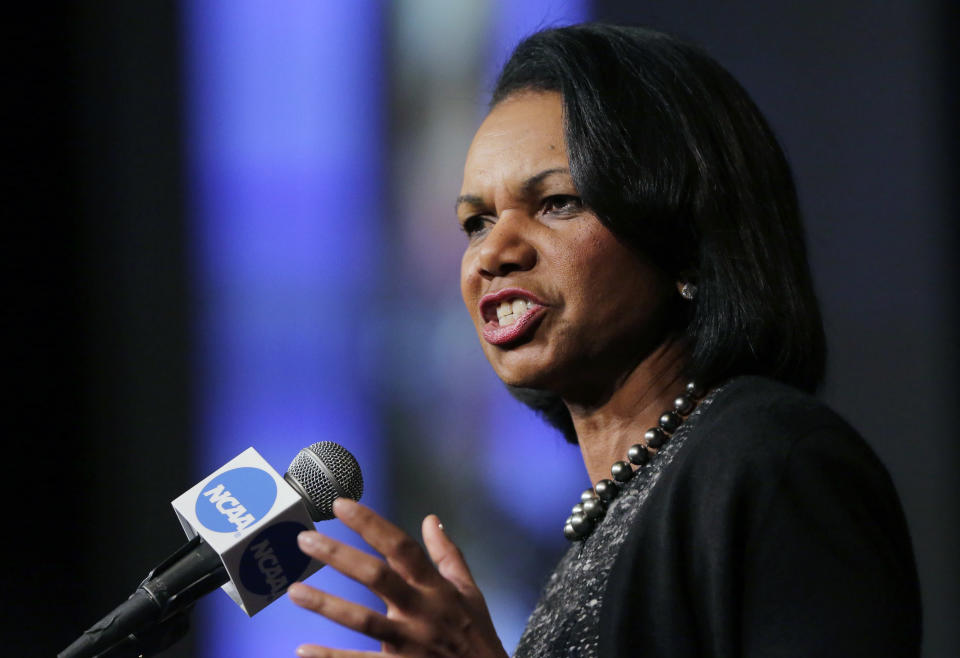Condi Rice commission on college basketball recommends sweeping reform
Seven months after a federal investigation shined a spotlight on the rampant bribery and corruption that has long plagued college basketball, the committee the NCAA tasked with fixing the sport has issued its recommendations for sweeping reform.
The Commission on College Basketball announced Wednesday that it favors getting rid of the one-and-done rule, permitting players to return to school if they go undrafted by the NBA and vastly increasing penalties for coaches who are caught cheating.
The first recommendation in the commission’s 60-page report called upon the NBA to eliminate its rule that since 2006 has effectively banned players from going straight from high school to the draft. If the NBA refuses to change its rule, the commission threatened to reconvene and consider other options, including rendering freshmen ineligible or locking a scholarship for three or four years if the recipient leaves a program after a single year.
The commission also recommended that undrafted high school and college basketball players retain their college eligibility unless they choose to sign a professional contract. Said the committee’s report, “Erroneously entering the NBA draft is not the kind of misjudgment that should deprive student-athletes of the opportunity to enter college or continue in college while playing basketball.”
Another notable suggestion from the committee was to impose harsher penalties for serious violations in hopes of deterring future rule breakers. Level I violations would be punishable with up to a five-year postseason ban and suspensions for coaches who fail to properly monitor their programs could last up to one full season.
Coaches or administrators who receive a show-cause order for committing serious violations could be subject to a lifetime ban. Schools that employ a coach and administrator under a show-cause order from a previous school would be at risk of receiving the harshest penalties should subsequent violations occur.

The committee also called for the NCAA to outsource the investigation and adjudication of serious infractions cases to an independent body.
Former Secretary of State Condoleezza Rice presented the commission’s report to the NCAA board of governors and Division I board of directors on Wednesday at NCAA headquarters in Indianapolis.
It was no surprise that the committee stopped short of recommending that college basketball players receive salaries from their universities, gain the right to sign endorsement deals or profit off the use of their name and likeness.
An examination of the NCAA’s system of amateurism was never one of NCAA president Mark Emmert’s objectives for the commission. Emmert has repeatedly stressed his belief in maintaining amateurism in college sports and handpicked a like-minded committee that shared his faith in the so-called collegiate model.
By not proposing that players be allowed to earn what they’re worth on the open market, the committee opens itself up to criticism from those who believe it failed to strike at the heart of the matter. Many have noted the scandal is rooted in simple economics: Elite players who generate millions of dollars for universities, TV networks, agents and shoe-apparel companies are unable to receive their share of the profit aboveboard because of NCAA rules prohibiting players from taking money beyond a scholarship.
One of the most frequent criticisms of the commission has been that Emmert appointed few committee members with actual firsthand knowledge of how cheating occurs in college basketball today. The 14-member committee featured plenty of accomplished, intelligent people but few who have recently attended a grassroots basketball game, let alone arrived with an understanding of how transactions for five-star prospects occur in modern-day college basketball.
There were no current college coaches, agents or shoe-apparel executives on the committee, nor were there any players who have gone through the recruiting process in the past quarter century. Ex-Georgetown coach John Thompson III and former Cal and Stanford coach Mike Montgomery were two of the only committee members who had been around the sport recently enough to understand how methods of cheating have evolved as rule breakers seek to stay one step ahead of NCAA investigators.
The rest of Emmert’s committee consisted of people from a wide range of backgrounds, from ex-NBA stars Grant Hill and David Robinson, to six current or former university presidents or athletic directors, to former White House counsel Kathryn Ruemmler. They each took a crash course over the past few months to better understand how lucrative bribes can help an agent gain access to a potential client or enable a shoe-apparel company to steer an elite prospect to a program affiliated with its brand.
“The recent news of a federal investigation into fraud in college basketball made it very clear the NCAA needs to make substantive changes to the way we operate, and do so quickly,” Emmert said in September. “Individuals who break the trust on which college sports is based have no place here. While I believe the vast majority of coaches follow the rules, the culture of silence in college basketball enables bad actors, and we need them out of the game. We must take decisive action. This is not a time for half-measures or incremental change.”
– – – – – – –
Jeff Eisenberg is a college basketball writer for Yahoo Sports. Have a tip? Email him at daggerblog@yahoo.com or follow him on Twitter!
More from Yahoo Sports:
• NFL prospect calls out 4 QBs in savage interview
• Gronk ends speculation about his plans for 2018
• Greg Cosell: Darnold might be the perfect project QB
• Chris Mannix: Why Smart was playing for more than just a Celtics win



